
ORGANISMS DIVERSITY & EVOLUTION
Scope & Guideline
Charting Evolutionary Pathways: A Journey Through Diversity
Introduction
Aims and Scopes
- Integrative Taxonomy:
The journal emphasizes the importance of integrative approaches that combine morphological, molecular, and ecological data to establish clearer taxonomic classifications and understand the evolutionary relationships among species. - Phylogenetics and Evolutionary Biology:
A core focus is on phylogenetic studies that explore the evolutionary history and relationships among various taxa, utilizing advanced molecular techniques and phylogenomic analyses. - Biodiversity Assessment and Conservation:
Research published in the journal often addresses biodiversity assessments, conservation strategies, and the implications of species diversity on ecosystem health and stability. - Morphological and Genetic Variation:
The journal encourages studies that investigate morphological and genetic variations within and among species, particularly in the context of ecological adaptation and speciation. - Ecological and Biogeographical Studies:
There is a consistent focus on ecological and biogeographical research that examines how environmental factors influence the distribution and diversity of organisms.
Trending and Emerging
- Molecular Phylogenetics and Genomics:
An increasing number of papers are utilizing genomic tools and molecular phylogenetics to uncover evolutionary relationships, reflecting a trend towards high-resolution phylogenetic studies. - Cryptic Diversity and Species Delimitation:
There is a growing focus on cryptic diversity, with research aimed at identifying previously unrecognized species through integrative taxonomy, highlighting the importance of comprehensive species assessments. - Ecological Genomics:
Emerging studies linking ecological data with genomic information are becoming more common, emphasizing the role of genetics in understanding ecological interactions and adaptations. - Conservation Genomics:
Research addressing the genetic aspects of conservation, including the implications of genetic diversity for species survival and adaptation, is gaining significant attention. - Impact of Climate Change on Biodiversity:
There is an increasing interest in how climate change affects biodiversity and evolutionary processes, with studies focusing on adaptation, speciation, and conservation strategies in light of environmental changes.
Declining or Waning
- Traditional Morphology-Only Studies:
There has been a noticeable decrease in studies that rely solely on traditional morphological methods for taxonomy, as integrative approaches incorporating molecular data have gained more traction. - Descriptive Taxonomy without Molecular Support:
Papers focused solely on descriptive taxonomy without the integration of molecular techniques appear to be declining, as researchers increasingly recognize the need for genetic corroboration in species identification. - Specific Localized Studies:
Research that concentrates exclusively on local or regional studies without broader implications for biodiversity or evolutionary theory has become less prominent, as the journal encourages studies with wider ecological or evolutionary significance.
Similar Journals
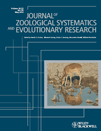
JOURNAL OF ZOOLOGICAL SYSTEMATICS AND EVOLUTIONARY RESEARCH
Unraveling Biodiversity Through Systematic ResearchThe Journal of Zoological Systematics and Evolutionary Research, published by Wiley-Hindawi, stands as a premier academic journal since its establishment, showcasing cutting-edge research in the fields of Animal Science, Zoology, and Ecology. With an impressive track record spanning from 1963 to the present, this journal has earned a Q1 classification in both Animal Science and Ecology, as well as recognized rankings in Genetics and Molecular Biology. Its impact is highlighted by its Scopus ranks, placing it in the top percentile for relevant categories, underscoring its vital role in advancing knowledge and understanding within these disciplines. Researchers, professionals, and students will find a wealth of high-quality, peer-reviewed articles that contribute to the evolutionary understanding of biodiversity and systematics. Though not an Open Access journal, it remains accessible to a wide audience committed to exploring the intricacies of zoology and evolutionary biology.
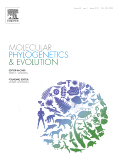
MOLECULAR PHYLOGENETICS AND EVOLUTION
Unraveling the Threads of Evolutionary HistoryMOLECULAR PHYLOGENETICS AND EVOLUTION is a premier international journal published by Academic Press Inc, Elsevier Science, focusing on the intricate relationships and evolutionary processes among organisms through the lens of molecular data. With an ISSN of 1055-7903 and an e-ISSN of 1095-9513, the journal is widely regarded for its high-impact research articles, boasting impressive category quartiles: Q1 in Ecology, Evolution, Behavior and Systematics, and Genetics, and Q2 in Molecular Biology as of 2023. These metrics position the journal as a significant contributor to the fields it encompasses, attracting a global audience of researchers, professionals, and students. The journal's impact is underscored by its Scopus rankings, which reflect its prominence in agricultural and biological sciences, particularly within its specialized categories. Aimed at advancing the understanding of phylogenetic relationships and evolutionary biology, this journal publishes cutting-edge research that is not only relevant but also essential for those engaged in evolutionary studies. Although open access options are not currently available, the rich content remains accessible to an academic readership dedicated to exploring the complexities of molecular evolution. Since its inception in 1992, the journal continues to evolve, promising to be at the forefront of scientific discovery through 2024 and beyond, encouraging submissions that push the boundaries of knowledge in molecular phylogenetics.

TAIWANIA
Unveiling the complexities of our natural world.TAIWANIA is a prestigious and long-standing journal dedicated to the fields of ecology, evolution, and systematics, published by NATIONAL TAIWAN UNIVERSITY PRESS. Since its inception in 1947, this open-access journal has provided a vital platform for researchers to disseminate their findings, encouraging collaboration and innovation in the ecological sciences. With a 2023 impact factor placing it in Quartile 2 for Ecology and Quartile 3 for Ecology, Evolution, Behavior and Systematics, TAIWANIA is recognized for its quality and influence, ranking #267 out of 461 in Environmental Science and #426 out of 721 in Agricultural and Biological Sciences within Scopus. The journal currently publishes contributions from both local and international researchers, showcasing a diverse array of topics that address crucial ecological issues and facilitate the advancement of knowledge in the discipline. For those seeking rigorous research, engaging reviews, and a commitment to open access, TAIWANIA remains a significant resource for the global scientific community.
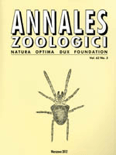
ANNALES ZOOLOGICI
Exploring the Depths of Animal LifeANNALES ZOOLOGICI is a distinguished academic journal published by the Museum & Institute of Zoology, Polish Academy of Sciences, based in Warsaw, Poland. With a long-standing tradition in zoological research, this journal has evolved to encompass a diverse range of studies in ecology, evolution, behavior, and systematics, aiming to foster a deeper understanding of animal biology and conservation. It holds a commendable Q2 classification in the 2023 Ecology, Evolution, Behavior and Systematics category, indicating its significant contribution to the field. Although ANNALES ZOOLOGICI is not an open-access publication, it remains accessible to a global audience of researchers, professionals, and students aiming to advance their knowledge and engage with cutting-edge zoological findings. As of 2024, this journal continues to be a vital resource for those eager to explore the complexities of animal life and contribute to ongoing discussions within this essential scientific discipline.
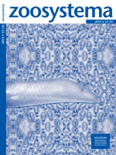
ZOOSYSTEMA
Fostering Innovation in Zoological ResearchZOOSYSTEMA is a prestigious academic journal published by PUBLICATIONS SCIENTIFIQUES DU MUSEUM, PARIS, specializing in the fields of Animal Science, Zoology, and Ecology. With a focus on advancing the understanding of biodiversity and evolutionary processes, this journal serves as a vital platform for researchers to disseminate significant findings and foster discussions within the scientific community. Boasting an impressive categorization in the Q2 Quartile rankings for both its primary fields, ZOOSYSTEMA is recognized for its impact and quality, as indicated by its notable positions in the Scopus rankings. While currently not Open Access, the journal provides essential insights and comprehensive reviews across its volumes published since 1998, making it a cornerstone in zoological and ecological research. Researchers, professionals, and students alike will find ZOOSYSTEMA an invaluable resource for understanding complex biological systems and their interrelations, contributing to informed conservation and management efforts globally.
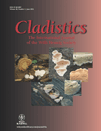
CLADISTICS
Pioneering Insights into Biodiversity and PhylogeneticsCLADISTICS is a premier academic journal published by WILEY, dedicated to advancing the fields of ecology, evolution, behavior, and systematics since its inception in 1985. Renowned for its rigorous peer-review process and commitment to high-quality research, the journal is listed in the top quartile (Q1) of its category as of 2023, ranking 50th out of 721 journals in the Scopus database, placing it in the 93rd percentile. This significant standing underscores its critical role in the dissemination of pioneering research and methodologies that are shaping modern evolutionary biology. With a focus on clade-based phylogenetic studies and their applications, *CLADISTICS* serves as a vital resource for researchers, professionals, and students alike, fostering a deeper understanding of biodiversity and evolutionary processes. Although it does not offer open access, the journal is committed to providing comprehensive, state-of-the-art content that continues to influence the scientific community and guide future research directions.

ANNALS OF THE MISSOURI BOTANICAL GARDEN
Unveiling Insights into Ecology, Evolution, and BehaviorANNALS OF THE MISSOURI BOTANICAL GARDEN is a prestigious, peer-reviewed journal published by the Missouri Botanical Garden, focusing on the rich disciplines of Ecology, Evolution, Behavior, and Plant Science. With a storied history dating back to 1946, this journal has evolved to become a significant platform for scholars and professionals to disseminate research that informs global understanding of plant biology and conservation. Ranked in the Q2 category for both Ecology and Plant Science in 2023, it boasts commendable standings within the Scopus rankings, placing it in the 66th percentile for Plant Science and the 65th percentile for Ecology, Evolution, Behavior, and Systematics. The journal's commitment to rigorous scientific standards ensures that it remains a vital resource for those seeking to explore vital ecological and botanical research. As a product of the esteemed Missouri Botanical Garden, the journal serves researchers, professionals, and students alike, encouraging collaboration and innovation in the plant sciences community.
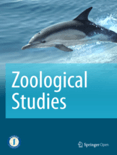
ZOOLOGICAL STUDIES
Driving innovation in the study of biodiversity.Zoological Studies, published by the Biodiversity Research Center, Academia Sinica, stands as a pivotal journal in the fields of animal science and zoology. With the ISSN 1021-5506 and E-ISSN 1810-522X, this Taiwanese journal features a blend of pioneering research that spans over three decades, from 1994 to 2024, fostering a deep understanding of biodiversity and zoological phenomena. Recognized for its scholarly contributions, Zoological Studies holds an esteemed Q2 ranking in Animal Science and Zoology for 2023, positioning it among the top-tier journals in its category with a Scopus rank of #164 out of 490—reflecting its strong impact and outreach. While currently not open access, the journal aims to disseminate essential findings and discussions that advance ecological knowledge and inspire future research endeavors. Researchers, professionals, and students alike will find this journal an invaluable resource for accessing critical studies that drive innovation and conservation efforts in the field of zoology.
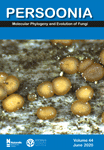
PERSOONIA
Innovating Research in Systematics and BotanyPERSOONIA, a distinguished journal published by RIJKSHERBARIUM, serves as a pivotal platform for the dissemination of high-quality research in the fields of Ecology, Evolution, Behavior, and Systematics, as well as Plant Science. Established with a commitment to advancing scientific knowledge, PERSOONIA has achieved an impressive Q1 ranking in these areas, highlighting its significant impact within the academic community, as evidenced by its ranking of #12 out of 721 journals in its field, placing it in the top 2% of publications. With a publication history that spans from 1996 to present, the journal regularly features innovative studies that push the boundaries of understanding in ecological and botanical sciences. While Open Access options are currently limited, researchers and professionals alike benefit from subscription access to this vital resource. Located in the Netherlands, PERSOONIA continues to be a beacon for scholars aiming to enrich the discourse in evolving ecological and plant science disciplines.
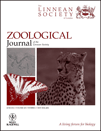
ZOOLOGICAL JOURNAL OF THE LINNEAN SOCIETY
Connecting past discoveries with future innovations in ecology.Zoological Journal of the Linnean Society, published by Oxford University Press, stands as a prestigious vessel for scholarly discourse in the fields of Animal Science and Ecology. With an ISSN of 0024-4082 and E-ISSN 1096-3642, this journal has an illustrious history dating back to its inception in 1866, and has consistently contributed groundbreaking research that shapes our understanding of zoology and evolutionary biology. Operating out of the United Kingdom, the journal boasts an impressive Q1 ranking in both Animal Science and Zoology and Ecology, Evolution, Behavior and Systematics, positioning it among the top tier of its category. With a significant presence in the academic landscape, the journal ranks 24th among 490 in Animal Science and 97th among 721 in Ecology, reflecting its impact and relevance in the field. Although it is not an open access journal, the wealth of knowledge it offers is invaluable for researchers, professionals, and students alike, aiding in the advancement of zoological sciences.